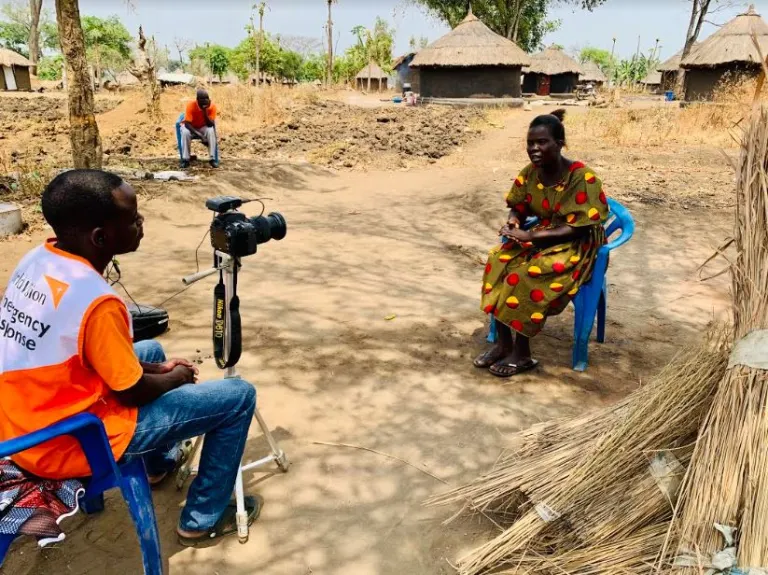By Irene Best Nyapendi
Derrick Kyatuka’s work gives him the opportunity to listen firsthand to stories of people in rural Uganda. It is these stories, many about refugees, that he crafts in a way to trigger help from donors. While oftentimes the stories are painful to hear, recording and sharing them has brought about change in their lives.

Kyatuka is a humanitarian communicator with the World Vision’s Uganda Refugee Response program, where he has worked for the past four years, shooting videos, writing stories and taking photos. And for the sweat that he broke in 2021, World Vision named him employee of the year.
To the 30-year-old who received his Bachelor of Arts in Journalism and Communication from Uganda Christian University (UCU) in 2016, the award is an opportunity for testimony.
“This award is a true testimony of how faithful God is and how he rewards his humble servants,” said Kyatuka, a son of Fred and Annet Kagyenzi of Rukungiri district in western Uganda.
But he is also aware that, many times, to earn recognition, in addition to hard work, luck must also be on one’s side. Kyatuka says that he does not see himself as the best humanitarian communicator that World Vision has ever had, but that he has been incredibly lucky and fortunate in the work that he has been able to produce.
And he has evidence for how luck has been on his side. In December 2021, one of his photos was chosen as the third-most powerful of the 47 favorite photos from around the world that were selected by World Vision.
“Such global moments of recognition have inspired me to work harder and devote more time to producing quality work,” he says, adding that when “good work is rewarded, it means more work.”

“As I go about my work, I keep reflecting on Colossians 3:23, which says ‘work willingly at whatever you do, as though you were working for the Lord, rather than for people’.”
His writings, photos, and videos have been used all over the world by World Vision Partnership, and they have helped World Vision Uganda get funding for some of their programmes. But he is quick to add that getting his works to a publishable level is no cup of tea. Kyatuka explains that for many of them, he has to burn the midnight oil to deliver quality work.
He has trained some communication champions in the areas where he works, to help him get timely content for the different projects he supports. “I believe everyone can become a great communicator if given the right mentorship and skills,” Kyatuka, who hopes to set up a mobile journalism training school one day, said.
He also has extended the training in mobile journalism to some of his fellow staff members to enhance their skills. He makes most of his videos using his smartphone, a growing trend that further reinforces the expansiveness of skills and knowledge that can be guided to create content.
“In this digital era, people should have communication skills to be able to produce compelling, rather than sensational content,” he said.
Kyatuka joined World Vision in 2017, as a temporary communication officer, and worked for seven months. He then joined New Vision as a freelance writer. However, not long after, there was an opening for a humanitarian communicator at World Vision, which he successfully applied for.
He is grateful to John Semakula and Stephen Ssenkaaba, who were his lecturers at undergraduate level. Both Ssenkaaba and Semakula encouraged him to join New Vision upon graduation.
“Ssenkaaba assigned me my first story in 2016, and Semakula introduced me to the weekend desk at New Vision,” he said.
Kyatuka, who is now pursuing a Master of Arts in Strategic Communication at UCU, studied at Mbarara High School in western Uganda for his O’level and St. Peter’s Secondary School, Nsambya, central Uganda, for his A’ level.


